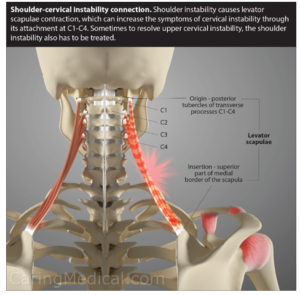Frozen Shoulder and Its Connection to Other Diseases
Frozen shoulder (adhesive capsulitis) is a condition that causes stiffness, pain, and a restricted range of motion in the shoulder joint. While frozen shoulder can occur without an underlying health condition, it has been associated with several diseases and disorders that may increase the risk of developing the condition. Below, we will explore the connection between frozen shoulder and various other diseases, and how these conditions can influence its development or severity.

Frozen Shoulder and Thyroid Disease
There is a known link between frozen shoulder and thyroid disorders, particularly hypothyroidism (underactive thyroid). People with thyroid disease are more likely to develop frozen shoulder, and it is estimated that up to 20% of people with frozen shoulder may have a thyroid disorder.
- Why it happens: The connection is not fully understood, but it’s believed that thyroid hormones affect tissue healing and inflammation. A lack of thyroid hormone may slow down the healing process of tissues around the shoulder joint, increasing the risk of developing frozen shoulder.
- What to look out for: If you have hypothyroidism and experience stiffness, pain, or limited mobility in the shoulder, it could be a sign of frozen shoulder.
Frozen Shoulder and Autoimmune Diseases
People with autoimmune diseases such as rheumatoid arthritis, lupus, and psoriatic arthritis are also at a higher risk of developing frozen shoulder.
- Rheumatoid Arthritis (RA): RA involves chronic inflammation of the joints, which can affect the shoulder joints, leading to frozen shoulder. Inflammation in RA can also cause changes in the joint capsule, which contributes to stiffness and restricted movement.
- Lupus and Psoriatic Arthritis: These autoimmune conditions can also contribute to shoulder stiffness due to inflammation, which increases the likelihood of developing frozen shoulder.
Frozen Shoulder and Heart Disease
There is evidence suggesting a connection between frozen shoulder and heart disease. Studies have found that people with heart disease, particularly those with a history of heart attacks, may be at an increased risk of developing frozen shoulder.
- Why it happens: While the exact cause is unknown, it may be due to changes in blood circulation, inflammation, or poor mobility associated with heart disease, which can affect the tissues around the shoulder joint.
Frozen Shoulder and Parkinson’s Disease
Patients with Parkinson’s disease, a neurological disorder that affects movement, are more likely to experience frozen shoulder due to muscle rigidity and poor posture caused by the condition.
- Why it happens: The rigidity and stiffness associated with Parkinson’s disease can lead to reduced movement in the shoulder joints, increasing the risk of frozen shoulder. Additionally, the neurological changes in Parkinson’s can make it harder for patients to perform movements that prevent shoulder stiffness.
Frozen Shoulder and Dupuytren’s Disease
Dupuytren’s disease is a condition in which the tissue beneath the skin of the palm thickens and forms nodules and cords. It is more common in people with frozen shoulder than in the general population.
- Connection: Both Dupuytren’s contracture and frozen shoulder involve the thickening of tissues around the joint. While Dupuytren’s affects the hand, frozen shoulder affects the shoulder joint, and both can lead to restricted movement and painful stiffness. The exact cause of this connection is not well understood, but it is believed that both conditions share a common underlying factor, such as collagen abnormalities.
Frozen Shoulder and Heart Disease
People with heart disease, particularly those with a history of heart attacks, may experience a higher risk of developing frozen shoulder. This connection could be related to the overall inflammation in the body, and the reduced mobility and circulation that can result from heart conditions.
- Why it happens: Inflammation caused by heart disease may contribute to tissue stiffness around the shoulder joint, which could lead to frozen shoulder. Additionally, the lack of mobility in people with heart disease can further exacerbate the condition.
The development of frozen shoulder can be influenced by several underlying conditions, such as thyroid disease, autoimmune disorders, heart disease, Parkinson’s disease, and Dupuytren’s disease. People suffering from these conditions should be aware of the increased risk of frozen shoulder and seek appropriate medical attention if they notice shoulder pain, stiffness, or limited mobility.
Additionally, for managing frozen shoulder, treatments such as physical therapy, medications, injections, or surgery may be necessary. In some cases, using devices like Curapod (which provides electrical stimulation) can help with pain relief, muscle relaxation, and improving mobility for those suffering from frozen shoulder.
References (Cardiff Harvard Style)
- Mayo Clinic, 2025. Frozen Shoulder: Symptoms and Causes. Available at: https://www.mayoclinic.org/diseases-conditions/frozen-shoulder/diagnosis-treatment/drc-20370892 [Accessed 28 February 2025].
- American Academy of Orthopaedic Surgeons (AAOS), 2025. Frozen Shoulder: Symptoms, Causes, and Treatment. Available at: https://www.aaos.org/diseases–conditions/frozen-shoulder/ [Accessed 28 February 2025].
- Spine-Health, 2025. Frozen Shoulder Treatment and Exercises. Available at: https://www.spine-health.com/conditions/shoulder-pain/frozen-shoulder [Accessed 28 February 2025].


